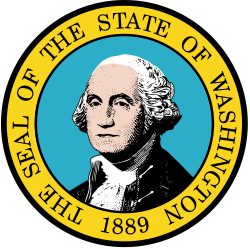| Elections in Washington (state) |
|---|
 |
In Washington, elections are authorized by Articles II, III, and IV of the Washington State Constitution, which respectively include the establishment of elections for the legislative, executive, and judiciary branches of the state government; Article VI establishes election procedures and rights.
Contents
- 1996
- 2000
- 2002
- 2004
- 2006
- 2008
- 2009
- 2010
- 2012
- 2013
- 2014
- 2016
- 2017
- 2018
- 2020
- Federal elections
- State elections
- 2022
- Federal elections 2
- State elections 2
- 2024
- Federal elections 3
- State elections 3
- See also
- References
- External links
Washington uses a vote-by-mail system under the supervision of the Secretary of State, mandated statewide since 2011. Counties were previously able to choose between it and in-person voting from 2005 onward, of which all but one adopted vote-by-mail by 2011. [1] Since 2008, most non-presidential elections are carried out using nonpartisan blanket primary, also known as the "top-two primary". [2]
In a 2020 study, Washington was ranked as the 2nd easiest state for citizens to vote in. [3]